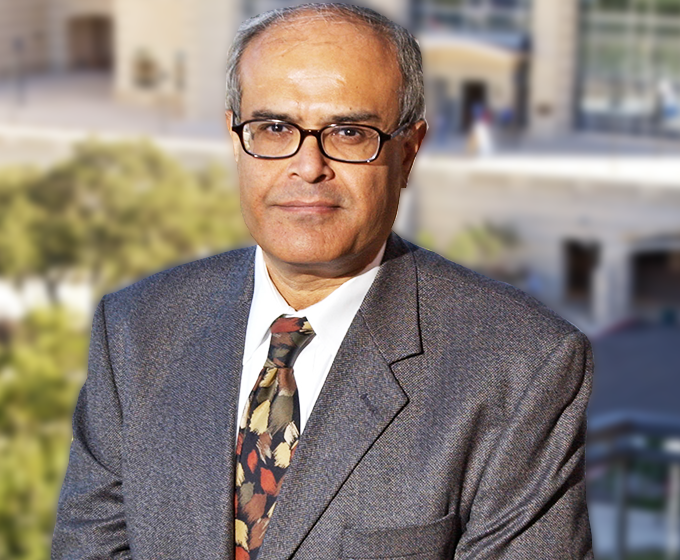
UTSA's Hamid Beladi was the lead principal investigator for a study that analyzed associations between COVID-19 mortality and excess weight in nearly 5.5 billion adults.
SEPTEMBER 30, 2021 — Links between obesity and mortality have become increasingly evident, since the earliest pandemic of the 21st century, leading researchers from The University of Texas at San Antonio and the University of Wisconsin-Milwaukee to investigate if excess body weight may have been associated with high rates of COVID-19 mortalities around the globe.
Lead principal investigator Hamid Beladi, UTSA’s Janey S. Briscoe Endowed Chair in Business, and his colleagues recently published a novel study in Public Health in Practice analyzing plausible associations of COVID-19 mortality and excess weight in nearly 5.5 billion adults from 154 countries around the world.
To identify potential patterns in data, the researchers employed cutting-edge techniques of statistical analyses.
“The main finding from the analysis is a statistically significant positive association between COVID-19 mortality and the proportion of the overweight in adult populations spanning 154 countries,” Beladi said. “This association holds across countries belonging to different income groups and is not sensitive to a population’s median age, proportion of the elderly, and/or proportion of females.”
Beladi added that when the proportion of the overweight people in a country's adult population is one percentage point higher than the proportion of the overweight in a second country's adult population, based on this study, it is reasonable to predict that COVID-19 mortality would be 3.5 percentage points higher in the first country than it would be in the second.
“The average individual is less likely to die from COVID-19 in a country with a relatively low proportion of the overweight in the adult population, all other things being equal, than she or he would be in a country with a relatively high proportion of the overweight in the adult population,” Beladi said.
The study’s authors say that, clinically, excess body weight is related to several comorbidities that can lead to an increasingly severe course of and consequent death from COVID-19. Metabolic disorders, for example, can predispose individuals to a poorer COVID-19 outcome. Since excess body weight can result in a greater volume and longer duration of contagion, it can also lead to a higher level of exposure to COVID-19.
They added that on average, the COVID-19 pandemic has been more fatal for adult populations residing in parts of the world characterized by excess body weight.
The researchers believe their findings can be used to uphold public policy regulations on the food industry, to the extent that it profits off the sales of processed foods, foods high in salt, sugar and saturated fats.
With the death toll from the current pandemic exceeding 4.5 million, the group’s main findings call for immediate and effective regulations that are long overdue, Beladi said.
“Some firms in the food industry have taken the liberty of using the pandemic as a platform for marketing in ways that are all but conducive to restraining body weight,” he explained. “Our observed association, between COVID-19 mortality and the share of the overweight in nearly 5.5 billion adults residing across 154 countries that host almost 7.5 billion people around the globe, serves as a caution against putting more lives at stake.”
UTSA is an urban serving research university that is committed to tackling society’s grand challenges. Its academic and research specialties include health, cybersecurity, fundamental futures and social-economic transformation.
UTSA Today is produced by University Communications and Marketing, the official news source of The University of Texas at San Antonio. Send your feedback to news@utsa.edu. Keep up-to-date on UTSA news by visiting UTSA Today. Connect with UTSA online at Facebook, Twitter, Youtube and Instagram.
Move In To COLFA is strongly recommended for new students in COLFA. It gives you the chance to learn about the Student Success Center, campus resources and meet new friends!
Academic Classroom: Lecture Hall (MH 2.01.10,) McKinney Humanities BldgWe invite you to join us for Birds Up! Downtown, an exciting welcome back event designed to connect students with the different departments at the Downtown Campus. Students will have the opportunity to learn about some of the departments on campus, gain access to different resources, and collect some giveaways!
Bill Miller PlazaJoin us for an intimate evening of cocktails, conversation, and culinary inspiration with Pati Jinich, Emmy-nominated chef and James Beard Award-winning author. Enjoy light bites and signature drinks in the warm, modern setting of Mezquite as Pati connects with guests over her passion for Mexican cuisine and storytelling.
Mezquite Restaurant in Pullman Market, 221 Newell Ave., San Antonio 78215From inspired courses to thoughtful pairings and a rich sense of community, the Ven a Comer Signature Dinner is a night of shared meals, shared stories, and unforgettable flavor.
Stable Hall (Pear Brewery), 307 Pearl Pkwy, San Antonio 78215Come and celebrate this year's homecoming at the Downtown Campus with food, games, giveaways, music, and more. We look forward to seeing your Roadrunner Spirit!
Bill Miller PlazaThe University of Texas at San Antonio is dedicated to the advancement of knowledge through research and discovery, teaching and learning, community engagement and public service. As an institution of access and excellence, UTSA embraces multicultural traditions and serves as a center for intellectual and creative resources as well as a catalyst for socioeconomic development and the commercialization of intellectual property - for Texas, the nation and the world.
To be a premier public research university, providing access to educational excellence and preparing citizen leaders for the global environment.
We encourage an environment of dialogue and discovery, where integrity, excellence, respect, collaboration and innovation are fostered.